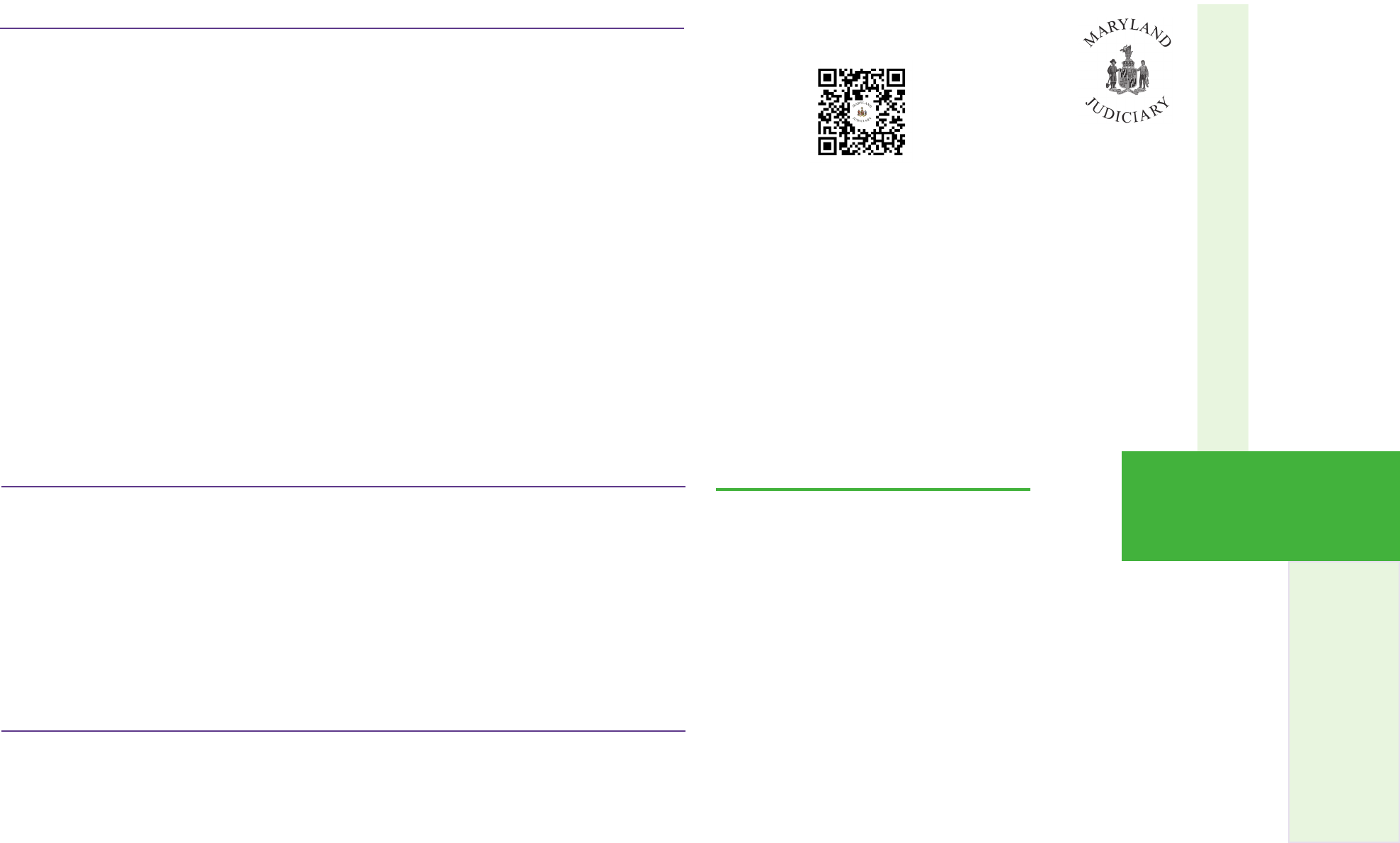
Am I eligible? / Am I not eligible?
For more information on Maryland courts and their
procedures, please contact a clerk in any state or
county courthouse.
For more information about the Maryland Judiciary,
visit the website:
mdcourts.gov
Information contained in this brochure is intended to
inform the public and not serve as legal advice. Brochure
is subject to unscheduled and unannounced revisions.
Any reproduction of this material must be authorized by
Government Relations and Public Aairs.
CC-DC-CR-072BR (Rev. 10/2023)
It is the mission of the
Maryland Judiciary to provide equal and exact
justice for all who are involved in
litigation before the court.
Expungement
Refer to Criminal Procedure Article §§ 10-105, 10-107, and 10-110 for specic ling requirements for
eligibility.
You are NOT eligible:
° unless ALL charges in your case can be expunged. (If two or more charges arise from the
same incident, they are considered a unit. However, minor trac charges are not part of the
unit. Related minor trac charges that arise out of the same incident do not aect your right
to expungement of other charges in the unit.)
° if you are a defendant in an active criminal case, including jailable trac violations. However,
if the case you are trying to expunge was closed with a verdict of not guilty, nolle prosequi,
acquittal, or dismissal, you may be eligible.
° if you received a Probation Before Judgment (PBJ) and within three years of receiving
the PBJ you were convicted of a new oense. (The PBJ cannot be expunged if the new
conviction is not eligible for expungement.)
° if you were convicted or received a PBJ for Driving While Intoxicated or Driving While Under
the Inuence.
° if your case includes minor trac charges only. The court does not have the authority to
expunge minor trac oenses. Only the MVA can expunge minor trac oenses. See
Transportation Article § 16-117.1.
Civil cases, including child support, liens, judgments, peace orders and protective orders CANNOT
be expunged.
If there is outstanding restitution, your petition for expungement may be denied by the court.
When to File for Expungement of conviction:
In order to be eligible for expungement, you must have satised your sentence including any supervision. Certain
misdemeanor convictions may be filed
after five (5) years.Certain felony convictions, assault in the second
degree and common law battery convictions may be filed
after seven (7) years.
First or
s
econd degree burglary
and felony theft may be led
after 10 years.
Domestically related convictions may be led
after 15 years.
For a list of expungable guilty oenses and the appropriate times to le, please see
form
CC-DC-CR-072G2.
Pardon – If you want to clear your record of a conviction that is not
eligible for expungement, you must rst get
a pardon from the Governor. An expungement based on a pardon must be led
within 10 years
from the date
the Governor signed the pardon. For more information on this process, you may contact the Maryland
Parole
Commission at
1-877-241-5428 or visit:
dpscs.state.md.us/agencies/mpc.shtml
Where do I File My Petition for Expungement?
I
n general, you will le your petition for expungement in the court where the case was concluded.
If your case was appealed, remanded, or transferred, please consult with an attorney, or the Court
Help Center at 410-260-1392 or visit: mdcourts.gov/helpcenter
is brochure details the process of the
expungement of adult criminal case records
and eligible civil citations. For information
related to the expungement of juvenile
records, please contact the juvenile division of
the circuit court where the case was led.
Contact information can be found at:
mdcourts.gov/circuit
Scan the above QR Code to nd more
information about expungements from the
Judiciary’s website
How to Expunge
Court Records

Frequently Asked Questions
I want to Expunge a Guilty Charge:
I
f you were found guilty, you may still be eligible for expungement.
A person is eligible to le if they were convicted of:
a criminal oense that is no longer a crime.
certain nuisance crimes.
cannabis possession under Criminal Law Article § 5-601.
specied crimes under Criminal Procedure Article § 10-110.
A person is also eligible to le if they received a citation for civil possession of cannabis under
Criminal Law Article § 5-601.1.
What does it Cost to File for Expungement? Can
the Fees be Waived?
There is no charge to expunge a case with a disposition of acquittal, not guilty, dismissal,
PBJ, nolle prosequi, stet, or NCR.
There is a $30 fee to le a petition for expungement of records with a guilty disposition
(CC-DC-CR-072B). Filing fees are non-refundable. If you cannot aord the fee, you may
request that the court waive the ling fee by ling a Request for Waiver of Prepaid Costs
(CC-DC-089).
Do I have to disclose my expunged charges?
• You may be required to disclose information about expunged cases in certain situations not
governed by Maryland law. If you are unsure about how to comply with the law, consult with an
attorney for advice, contact the Court Help Center at 410-260-1392 or visit:
mdcourts.gov/helpcenter
Will the public still be able to view records on case search after the record is expunged?
• No
Do I need an attorney?
• No, but an attorney may be helpful to you.
Will a bench warrant be issued if I do not appear for an expungement hearing?
• No, but your petition may be dismissed.
Do I need to File a Petition? If so, which Petition
should I file?
After October 1, 2021, any case that resulted in acquittal, dismissal, not guilty, or
nolle prosequi will be automatically expunged after three (3) years if you take no
action. However, you do not have to wait for the automatic expungement, and you
may want to le a petition.
There are three (3) types of Petitions for Expungement of Records:
Use form CC-DC-CR-072A - Acquittal, Dismissal, PBJ, Nolle Prosequi, Stet, or Not Criminally Responsible if:
your petition is based on an acquittal, not guilty, a nolle prosequi, or a dismissal.
You may le three (3) years after disposition. You may le earlier than three (3)
years if you sign and le a General Waiver and Release of all of your legal claims
arising from the charge.
your petition is based on a PBJ. You may le after probation is completed or
three (3) years after probation was granted, whichever date is later. However, if
your probation was completed in less than three (3) years, you may le a motion
for a good cause exception and the court will decide whether there is good cause
to grant an early expungement.
the petition is based on a stet. You may le three (3) years after the case was
marked stet on the docket. However, if it is less than three (3) years you may le a
motion for a good cause exception and the court will decide whether there is good
cause to grant an early expungement.
the petition is based on a nding of Not Criminally Responsible (NCR) for specied
nuisance crimes such as, but not limited to, urinating in public or open container.
You may le three (3) years after the NCR nding is made.
Use form CC-DC-CR-072B - Guilty Disposition if:
your petition is based on a guilty disposition.
Use form CC-DC-CR-072C - Acquittal, Dismissal, Not Guilty, or Nolle Prosequi (Less than 3 Years Has
Passed Since Disposition) if:
you would like to le to have your case expunged before the case is scheduled
to be automatically expunged. A case will be automatically expunged in three (3)
years if the case was closed with a nal disposition of acquittal, not guilty, dismissal,
or nolle prosequi.
What Can I Expect After Expungement?
The expungement process takes about 90 days from the date that you le your petition.
The State’s Attorney’s Oce has 30 days from when they receive the petition to
object to any petition for expungement.
If no objection is led after 30 days, the court will issue an order to any agency
involved in the case and they have 60 days to comply with the court’s order to
expunge the records.
You will receive a Certicate of Compliance in the mail to notify you that your expungement
has been completed.
The Criminal Justice Information Service (CJIS) handles expungements for the entire State
of Maryland. Expungements are processed in the order in which they are received, but
CJIS compliance may take longer than 60 days.
